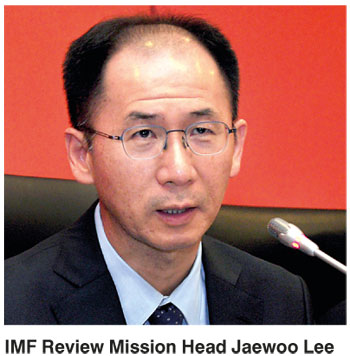Wednesday Feb 18, 2026
Wednesday Feb 18, 2026
Saturday, 10 December 2016 02:50 - - {{hitsCtrl.values.hits}}
By Uditha Jayasinghe
The International Monetary Fund (IMF) yesterday termed Sri Lanka’s performance under its Extended Fund Facility (EFF) “broadly satisfactory” and praised the Government for exceeding targets in revenue collection but warned increasing external vulnerabilities could affect growth targets and warrant fresh tightening of rates in 2017.
On 18 November 2016, the Executive Board of the International Monetary Fund (IMF) completed the first review of Sri  Lanka’s economic performance under the program supported by a three-year extended arrangement under the $1.5 billion EFF arrangement.
Lanka’s economic performance under the program supported by a three-year extended arrangement under the $1.5 billion EFF arrangement.
Completion of the review enables disbursement of the equivalent of SDR 119.894 million (about US$ 162.6 million), bringing total disbursements under the arrangement to the equivalent of SDR 239.788 million (about US$ 325.1 million). A second review is expected in late April before the third tranche is released.
The Government’s reform program, supported by the IMF, aims to reduce the fiscal deficit, rebuild foreign exchange reserves, and introduce a simpler, more equitable tax system to restore macroeconomic stability and promote inclusive growth, the IMF said in a statement.
“Sri Lanka’s performance under the Fund-supported program has been broadly satisfactory despite challenging circumstances. Macroeconomic and financial conditions have begun to stabilise, inflation has trended down, and the balance of payments has improved. Meanwhile, international reserves remain below comfortable levels,” head of the IMF staff team Jaewoo Lee told reporters.
“The Central Bank should be ready to tighten policy if global vulnerabilities grow. We emphasise on this readiness.”
However, the IMF stressed that fiscal performance has been encouraging and the reinstatement of the amendments to the value added tax will help boost revenues. “The 2017 budget proposal aims to strengthen government finances through revenue mobilisation, while guarding against revenue shortfalls by aligning spending with revenue on a quarterly basis. The new Inland Revenue Act scheduled for early next year should result in a more efficient, transparent, and broad-based tax system,” he added.
Complementary structural reforms in tax administration, public financial management, and the governance and oversight of state-owned enterprises are critical for durable fiscal consolidation, Lee noted. He also pointed out that Sri Lanka’s structural reforms have been moving slower than expected and warned that long term and sustainable fiscal consolidation would be difficult without them.
“While inflation has abated, credit growth remains strong. The Central Bank indicates its readiness to tighten the monetary policy stance further if inflationary pressures resurge or credit growth persists. The authorities intend to continue building up reserves through outright purchases while allowing for greater exchange rate flexibility,” Lee said.
IMF officials advocated the Government speedily formulate a policy for flexible exchange rates and suggested that a depreciated rupee would protect reserves, encourage investors and insulate against global vulnerabilities. Lee also warned that growing global uncertainty following a widely expected US Fed rate hike would constrain growth. Lee went onto say that IMF forecasts put Sri Lanka’s growth for 2016 at 4.5% and 2017 growth at 4.8%, which is significantly lower than 5.3% and 6% growth targeted by the Sri Lanka Central Bank.
“The banking sector is currently well capitalised. Steps are being taken to find a resolution mechanism for the distressed financial institutions. Going forward, there is a need to strengthen the supervisory and regulatory framework, and identify and mitigate vulnerabilities in the financial sector, particularly with regard to non-banks and state-owned banks,” Lee said.